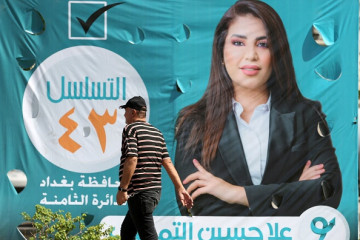

As Iraq gears up for the approaching elections, one of the most noticeable developments is the fierce competition growing over the women's quota. Women have been allocated one out of the three parliamentary seats in every electoral district, and the fight is on to win these seats, especially in the north and west of the country, a region bearing the scars of the "War on Terror" and which has yet to see a return to stability.
According to the new election law in Iraq, the women's quota will ensure that the number of female MPs (83) will equal the number of electoral districts in the next parliament.
Competition hots up in the North and West, former IS-held areas
According to the Iraqi electoral commission, there are over 900 female candidates out of a total number of around 3,500 for the elections due to take place in October. Among the candidates are dozens of women who will be competing for seats in Anbar, Nineveh, Saladin, Kirkuk, Diyala, Baghdad and Babel. This will be the fifth parliamentary election since the American invasion in 2003.
"As Iraq gears up for the approaching elections, one of the most noticeable developments is the fierce competition growing over the women’s quota"
Despite what remains of Islamic State (IS) having issued multiple threats against those participating in the Iraqi elections, candidates have continued their campaigns undeterred in these areas.
The decline in the traditional powers
Iraqi Member of Parliament, Ahmed Kanani attributes the rising competition over the women's quota seats to the fact that the declining popularity of the traditional power blocs has pushed them to shift their attention to utilising the women's quota.
He said to Al-Araby Al-Jadeed, The New Arab's Arabic-language sister publication: "These blocs want to ensure the biggest number of seats possible by using the women's quota, not because they think women should be represented, but because these forces have realised that their popularity has dropped among the Iraqi population and they are being widely rejected in these regions: this is what has pushed them to instrumentalise the quota".
He also acknowledged that "the failure of many (male) ministers in previous parliaments to offer decent services in these regions and answer the needs of the citizens may motivate people to vote for female candidates. However, we are hoping that the women elected have the skills to offer something better to these regions, and it isn't a question of just taking a seat".
Women capable of offering services and stability
Former MP Noura al-Bajari, who is standing in Nineveh province, defended women's ability to achieve a lot for their areas. Al-Bajari said: "There are a lot of women on the candidate lists, especially in the densely populated areas which were liberated from IS control". She explained that some of the women are former ministers and others aren't, but "all of them have a clear popular following and wield influence in their communities".
She said: "There is a growing trust in the competence of women and their ability to provide more services and stability in these regions and a belief that they will take the role seriously". She explained that "popular support for women candidates has increased due to the lack of corruption scandals around women, and women's voices are becoming stronger".
"There is a growing trust in the competence of women and their ability to provide more services and consistency in these regions, and a belief that they will take the role seriously"
She adds: "We have even found support in the tribal areas - despite their patriarchal traditions, today many are looking at women differently. If capable women win seats during the elections, this will help women play a more influential role in the next parliament".
Powers that be unwilling to loosen their grip
However, Ghalib Al-Zaydi, who teaches political science at the University of Baghdad, is more cynical: "The support for all these women candidates in these regions doesn't indicate a rejection of the traditional powers that be in Iraq, rather it affirms their continuation: these groups are the ones who have chosen female candidates and funded their electoral campaigns.
"Whoever wins out of these candidates will not be able to stray from the policies of these groups".
He concluded: "The domination of these forces over the women's quota just represents a new front of the powerful forces which hold sway in Iraq, who move their candidates around the electoral districts as they please.
"The gender quota in truth is a system which discriminates against women as it curtails and limits women's participation. Similarly, it has presented these powerful forces with a way to exploit women for their own political gain".
This is an edited translation from our Arabic edition. To read the original article click here.
Translated by Rose Chacko




 Follow the Middle East's top stories in English at The New Arab on Google News
Follow the Middle East's top stories in English at The New Arab on Google News


